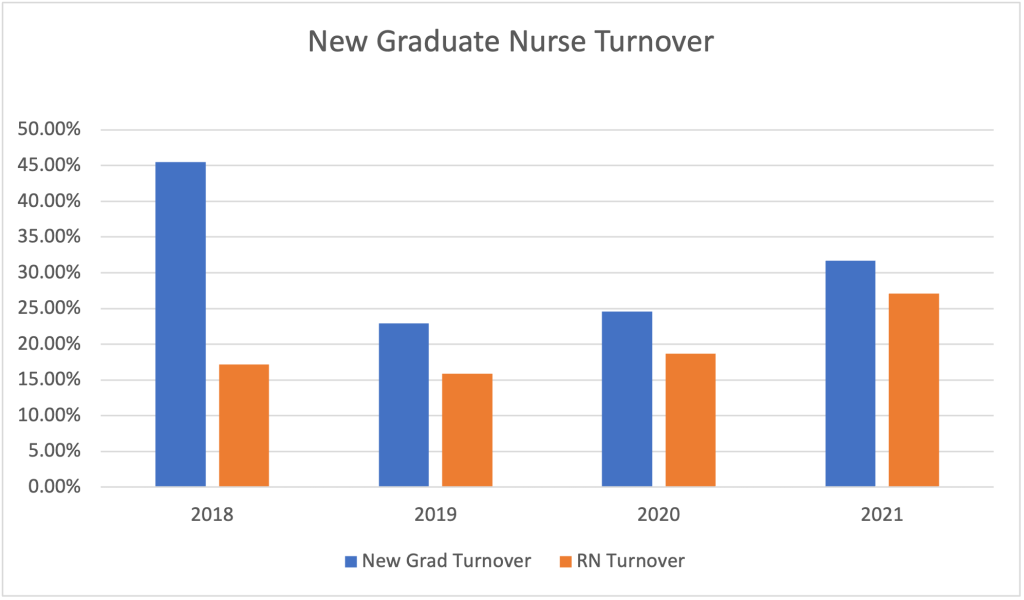Course
How to Reduce New Nurse Turnover
Course Highlights
- In this course we will learn about the prevalence of new nurse turnover, and why it is important for nurses and healthcare management to actively work toward increasing retention.
- You’ll also become familiar with definitions and examples of bullying and incivility, as it pertains to nursing.
- You’ll leave this course with a broader understanding of ways to work toward improving new nurse turnover.
About
Contact Hours Awarded: 1.5

Course By:
Cathleen Adams
MBA, RN, CENP
Begin Now
Read Course | Complete Survey | Claim Credit
➀ Read and Learn
The following course content
New graduate nurse turnover has increased at a faster rate than the overall nurse turnover. New graduate nurses leaving the field can lead to poor quality outcomes, a reduction in staff satisfaction and is a further determinant and contributor to the nursing shortage.
One of the primary reasons cited by nurses that leave the field within their first year is due to a lack of collegial relationships. Additional surveys showcase bullying and incivility against new nurses, which is a problem that has been documented for over 30 years and is still active today. Seasoned nurses have an opportunity to improve new nurse turnover rates by providing them with support, comradery, and civility.
Introduction
Before graduating from nursing school, I was accepted into a six-month program to train for the cardiac medical ICU. I took the initial competencies and classroom training and was assigned an experienced preceptor on the ICU floor. My preceptor very quickly informed me that I was bothering patients by being too attentive. Soon after, she let the rest of my colleagues know that she would be retiring because the job had become dangerous now that so many new nurses were joining our unit. That was just the first week on the floor.
Throughout my first year of nursing, I was anxiety-ridden and questioned staying. Despite my rough start, I made it through and have enjoyed over 20 years as a nurse; however, many of my classmates not only resigned before their first year was over, but a few left nursing altogether.
During my tenure as a nurse, I have learned that incivility and bullying are all too common. In a 2021 safety report, No Place for Bullying in Healthcare, The Joint Commission indicated bullying and incivility are at an all time high. In a 12 month period, 29% of registered nurses and nursing students reported being physically assaulted and over 50% reported being verbally abused (15). Among new nurses, 60% of nurses who left their first job within 6 month cite coworker behavior (6).
Below, I have listed just one example from a nursing blog that showcases how bullying and incivility haven’t changed much from my experiences with it over 20 years ago.
“I have an orientation with a nurse educator. And she’s kind of a bully; I have to say. She puts me in uncomfortable situations. She dismisses anything I say; she gives me ridiculous and menial assignments while excluding me from doing tasks with her directly related to my new role, that I could learn better. Yet, she talks over and over about the things I already know. She gives me contradicting information. At this point, my self-esteem has got even lower than when I started” (16).
In response: “This is the issue I have with the profession… more than likely, they pounced on you because you’re new, and they’re asserting their dominance/reinforcing cliques (them vs. us). Either behavior making for toxic workplace culture… And I say this from experience” (16).

Self-Quiz
Ask Yourself...
- What was your own experience as a new graduate nurse, and what impact does that have on your career today?
New Graduate Nurse Turnover Rates
New Graduate Nurse Turnover Rates, New graduate nurse turnover consistently exceeds more tenured nurses. The disparity widens after 5 years in nursing (4,8,9).

After only their first year, the new nurses’ turnover rates continue to rise until almost half of them have either left their departments or nursing in its entirety (8).

Of further concern, in a 2020 The Nursing Solutions, Inc. nurse turnover report, they project a significant increase in nurse deficits as a result of the COVID-19 pandemic (13). The report surveyed over 1000 nurses, and the results determined that 96% of respondents showed signs of burnout, and 56% reported they would be leaving either direct patient care specialties or the nursing profession in its entirety through resignation or retirement (13).
Reasons for New Nurse Turnover
There are various reasons as to why new nurses are leaving the field and contributing to the increase in nurse turnover; however, there is one trend that has remained consistent for decades. The initial peer-to-peer and orientation/precepting relationships established can truly make or break a new nurse.
Researchers often correlate the incivility and bullying of nurses to a lacking collegial or peer-to-peer relationships. Many nurses who cite bullying or incivility in the workplace often claim they are leaving the job due to their preceptors. For nurses with years of experience under our belt, since collegial relationships are a primary driver of turnover and retention for new nurses, we must assume responsibility for our part as peers and work to reduce the continuous rise in new nurse turnover.

Self-Quiz
Ask Yourself...
- Thinking of your fellow nurse graduates, what percentage do you predict will leave the nursing field and why?
- How meaningful are collegial relationships to you at this point in your career versus your first year in nursing?
Effects of New Graduate Nurse Turnover
There is no argument that the cost of increasing new nurse turnover rates has all-encompassing effects. New graduates may lack full in-person experience of nursing and are not fully prepared to meet all practice-based standards; this requires more hands-on training and nursing experience. Nurse-sensitive outcomes, including falls, pressure ulcers, and nosocomial infections, suffer in the hands of continual learners. Higher rates of mortality have been linked to higher turnover rates (14).
Although the training and precepting of new nurses is necessary on all accounts, it can be challenging and demanding for the already short-staffed and stressed nurses with experience. With the combination of continuous training and increased workload demands, patient satisfaction and community trust in the organization begins to erode (5, 8).
Employee morale for both new and experienced nurses suffer due to the increase in expectations and workload (14). In high patient volume scenarios, training and precepting may take the back burner to cover patient census, which leads to missed learning opportunities and perpetuates a lack of clinical expertise as the new nurses move forward in their career. This lack of knowledge can lead to intolerance or ridicule by the better-prepared nurse and possible disciplinary action for the up-and-coming nurse.
The cost for recruitment and hiring of new nurses along with the costs for filling vacated positions with travel and contracted nurses are estimated to be 5% of a hospital’s annual budget (11). Since labor cost accounts for up to 50% of the budget, productivity remains a top priority despite increased workload demands; leaving staff and administrators disconnected in determining actions that may positively affect patient and staff satisfaction.
I understand that these are not new statistics, and few nurses would knowingly jeopardize their safety and patient care. However, the fact remains that the culture persists, and the new nurses that receive this type of treatment pass it on. As part of the change process, our first action may start with recalling what it was like for us as new graduate nurses.

Self-Quiz
Ask Yourself...
- Do you have examples, either positive or negative, of nursing turnover affecting your unit’s patient care and satisfaction?
Challenges for New Nurses
New nurses typically receive the “short end of the stick” when joining an organization, as the employer will most likely fill them in the neediest shifts, including nights, rotating, weekend, and holiday shifts. While this is not ideal for the new nurse, we accept it as part of the dues that they must make.
The Nursing Times Workforce reports that many nurses come into the field with anxiety (12). When I first became a nurse, I, too, experienced anxiety. I ended up mentioning my feelings to one of my colleagues who supportively advised me that my anxiety was a good sign; it indicated that I would be a more cautious nurse. I took comfort in this, but as I now reflect, I do not believe it to be the whole truth.
Cautiousness is a characteristic in and of itself, and although it can present as anxiety, the feeling of dread can be resolved with positive experiences that lead to confidence. The anxiety that I felt, and what new nurses typically describe tends to be fear-based, whether it is real or perceived. On top of this, up to 18% of hospital nurses report symptoms of depression which is double the general population (12).
When you couple this anxiety with incivility, bullying, or general lack of support, it becomes easy to see how the rates of new nurse turnover continue to rise. Below are just a few examples of sub-Reddit postings from current new nurses and the challenges they are facing with their mental health:
“My anxiety/depression has worsened to the point where I can’t sleep the night before I work and I’m constantly overthinking or worrying about my job. I’m miserable and on edge, and I feel like this just can’t be worth it. I was looking to move out of bedside nursing and was curious what my options are, especially with less than a year of experience” (17).
“Hello! I work dayshift med surg. My biggest issue is when I get home, I’m anxious. I think about my shift and worry I forgot something. I get nervous that when I come back the next day, the night nurse will pick me apart because I missed things. I sleep terribly in between shifts. I just always worry about what I did. Need advice. Does this happen to anyone else? Best tips to not worry?” (18).
“I am fresh off orientation and am beginning to suffer from anxiety attacks while at home. I wake up in sweats thinking about my unit. I feel weak because my peers are not feeling these same things. It’s disheartening knowing that I worked my butt off in nursing school to end up feeling like crap every day. I don’t know what to do. I hear it gets better, but now I’m questioning if I should’ve ever become a nurse. Caring for people is all I wanted to do, but maybe I wasn’t cut out for this” (19).


Self-Quiz
Ask Yourself...
- What advice would you give to support other nurses with anxiety or depression?
Bullying and Incivility
The Workplace Bullying Institute (2024) defines bullying as, “abusive conduct that takes the form of verbal abuse; or behaviors perceived as threatening, intimidating, or humiliating; work sabotage” done repeatedly by one or more employees to another (21).
As previously mentioned, bullying is a prevalent issue in the field of nursing, and there are many speculations as to why it is common for nurses to bully their colleagues. One being, that nurses tend to garner less respect from other disciplines such as doctors or pharmacists. Other reasons may be due to the natural competitiveness of the healthcare professions, or the inability to control most of their work environment and patient outcomes so overstepping and bullying fellow nurses is their only constant form of control or normalcy (7). Common examples of bullying in nursing include verbal abuse and harassment.
Incivility is a form of bullying, except the intent is more ambiguous; so much so that it often goes unrecognized and can even be disguised as a learning opportunity. Incivility often gets ignored by management out of empathy for the experienced nurses being under stress, or out of fear of confronting a trained nurse and causing them to leave – contributing to the chronic short-staffing in healthcare facilities. Nurses who experience this behavior tend to pass it on as a rite of passage, leading to the perpetuation of nurses’ culture “eating their young” (7).
Some signs of the behavior include (5, 6, 7):
| Behavior | Examples |
| Eye Rolling | Response to a new RN‘s request for assistance. |
| Disrespect | Intentionally not informing a new nurse of best practice or other information relevant to the organization. |
| Gossip | Overstating or exaggerating a new nurse’s shortcomings, faux pas, or errors to co-workers. |
| Blaming | Naming a new nurse as part of an incident report. |
| Rudeness | Informing a new nurse of the burden you are undertaking by precepting. |
| Unfriendliness | Refusal to greet or include a new nurse in social conversation. |
| Ignoring | Being unavailable to the new nurse. A survey of new graduates revealed 27.5% of nurses reported preceptors were rarely or never available (3). |

Self-Quiz
Ask Yourself...
- Have you experienced or witnessed acts of incivility or bullying against yourself or your peers?
- Thinking back, how has your specific nursing unit handled acts of incivility or bullying?
How to Support New Nurses
There is good news on the horizon. 32 states have now introduced anti-bullying legislation called the Healthy Workplace Bill (HWB). This bill aims to hold employers accountable for acts of bullying to their employed (21).
In the article, “4 Compelling Theories Why Nurses ‘Eat Their Young,’” Maura Hohman says, “The number one most powerful behavior is for the witness to speak up and support the person who is being targeted (7). “While this is easier said than done, there is evidence that developing a script to confront individuals when this occurs can be useful (12). At the very least, it shows support for the new nurse.
Other essential activities to improve instances of incivility and bullying in the workplace while reducing the new nurse turnover rate include:
- Becoming familiar with your organization’s policies and procedures on incivility, bullying, and workplace violence. If your organization does not address this issue, it is your responsibility to recommend and participate in developing the needed policies. The HWB may be a useful reference (21).
- Advocating for education on recognizing and preventing incivility and bullying through your professional association, nursing schools, and organization 3).
- Practicing “Just Culture.” Unless the same error occurs repeatedly, the new nurse’s intent is your primary tool for guiding consequences. Never blame or name if unnecessary when reporting an error. Limit your information to the facts only. Mistakes are to be investigated for the root cause, which is rarely person-related, and almost always process, culture, and system design.
- Learning opportunities are just that; don’t chastise. If you are angry or irritated, consider your real intent. Learning opportunities are rarely cultivated in an emotional environment.
- Being a supporter of other nurses.
American Nurses Association’s (3) civility best practices include:
- Strive to develop clear verbal and non-verbal communication. Be direct when needed and always respectful.
- Treat others with kindness, as well as collegiality, and always with dignity.
- Be mindful that every individual suffers, and your actions and words affect others.
- Avoid gossip and call it out when you hear it from others.
- Rely on facts; never speculate and be slow to conclude until evidence has been discovered.
- Be collaborative and share information when appropriate.
- Offer help and accept appropriate refusal graciously.
- Be aware, accountable, and responsible for your actions.
- Speak directly to the person with whom you have an issue.
- Seek other points of view, perspectives, and experiences. Listen to others with interest.
- Apologize when necessary.

Self-Quiz
Ask Yourself...
- Are you knowledgeable of your hospital‘s policies on incivility, bullying, and workplace violence?
- Do your hospital policies align with the ANA?
Recognizing Burnout and Opportunities to Reduce New Nurse Turnover
Since a lack of collegial relationships and peer-to-peer support are contributing factors leading to burnout and turnover, there is a lot you can do to prevent both. Besides following the steps above, recognizing burnout and signs of pending turnover are essential to quick intervention.
The symptoms of burnout are noticeable in this at-risk population who may begin:
- Not participating in social activities.
- Not participating in improvement activities or opposing workplace changes.
- Calling off shifts, especially when they have been highly dependable.
- Arriving late for their shift.
- Taking excessive breaks or leaving the floor for support personnel activities when not necessary.
- Presenting with a negative attitude or being insensitive to patients and families.
- Verbalizing overwhelming anxiety or dread at coming to work
(13)
If you notice these behaviors, it is time to intervene to avoid nurse turnover. One of the best strategies is to become a mentor or friend to them. Having someone to vent to helps relieve stress, and your engagement will go a long way in building positive experiences for the new nurse (12).
If you have an employee assistance program, refer them to your human resources depart and inform them of all the available resources that you know of. Employee assistance programs offer confidential counseling for many personal and work-related concerns. If the situation persists, get your manager involved. It is their job to know and offer additional supportive resources to their employees.

Self-Quiz
Ask Yourself...
-
Can you think of a nurse who your outreach may support?
Conclusion
There are many contributing factors to new nurses’ turnover. It is the responsibility of healthcare organizations, professional associations, and nursing educators to work together to improve the barriers that are causing this consistent increase in nurse turnover rates that are further contributing to the global nursing shortage. To deliver quality patient care, improve health outcomes, and increase workplace satisfaction we need nurses.
Regardless of how much experience you have, there are ways you can contribute to ending this increasing new nurse turnover, and that is by becoming an advocate and mentor for them. Speak up to support a new nurse and become familiar with your organization’s incivility, bullying, and workplace violence policies.
References + Disclaimer
1 American Association of Colleges of Nursing. (2020, September). Nursing Shortage. Retrieved March 2021, from aacnnursing.org: https://www.aacnnursing.org/news-information/fact-sheets/nursing-shortage
2 American Hospital Association. (2024, February 15). Innovative Nurse Residency Program Aims to Reduce Nurse Turnover. Retrieved from American Hospital Association: https://www.aha.org/aha-center-health-innovation-market-scan/2023-05-09-innovative-nurse-residency-program-aims-reduce-nurse-turnover
3 Curtin, L. S. (2020, August). Nurse turnover: Understand it reduce it. American Nurse Journal, 57-59. Retrieved from MyAmericanNurse.com: https://www.myamericannurse.com/wp-content/uploads/2020/08/an8-Turnover-728.pdf
4 Edmundson, C., & Zelonka, C. (2019). Our own worst enemies: The nurse bullying epidemic. Nursing Administration Quarterly, 274-279.
5 Hohman, M. (2019, June 13). 4 compelling theories why nurses “eat their young”. Retrieved from florence-health.com: florence-health.com/career/nurse_practitioner/4-compelling-theories-as-to-why-nurses-eat-their-young/
6Hu, H., Wang, C., Lan, Y., & Wu, X. (2022). Nurses’turnover intention, hope and career identity: mediating role of job satisfaction. . BMC Nurs.
7 Katz, D., Blasius, K., Isaak, R., Lipps, J., Kushelev, M., Goldberg, A., & Demaria, S. (2019). Exposure to incivility hinders clinical performance in a simulated operative crisis. . BMJ Quality & Safety, 750-757.
8 Lockhart, L. (2020, March/April). Strategies to reduce nursing turnover. Retrieved from Nursing Made Incredibly Easy!: https://journals.lww.com/nursingmadeincrediblyeasy/fulltext/2020/03000/strategies_to_reduce_nursing_turnover.10.aspx
9 NSI Nursing Solutions, Inc. (2024). 2023 NSI National Health Care. NSI Nursing Solutions, Inc.
10 Nursing Times. (2019, September 02). Nurses support their young: From competitors to mentors. Retrieved from Nurisng Times-Workforce: https://www.nursingtimes.net/news/workforce/nurses-support-young-competitors-mentors-02-09-2019/
11 Nursing Times. (2019, September 02). Nursing Times-Mentors. Retrieved March 2021, from Nursing Times: https://www.nursingtimes.net/roles/mentors/advertising-feature-avoid-nurse-burnout-02-09-2019/
12 Subramony, M., Vogus, T., Chadwick, C., Gowen, C., & Macfadden, K. (2024). Workload, nurse turnover, and patient mortality: Test of a hospital-level moderated mediation model. Heathcare Management Review 49, 23-34.
13 The Joint Commission. (2021, June). Quick Safety Issue 24: Bullying has no place in health-care. Retrieved from The Joint Commission: https://www.jointcommission.org/resources/news-and-multimedia/newsletters/newsletters/quick-safety/quick-safety-issue-24-bullying-has-no-place-in-health-care/bullying-has-no-place-in-health-care/
14 u/martianteen. (2021, March). Bullying at work : nursing. . Retrieved from Reddit: https://www.reddit.com/r/nursing/comments/lxah2z/bullying_at_work/
15 u/phol10. (2021, March). New nurse dealing with new onset of anxiety (r/nursing, 2021) nursing. Retrieved from Reddit: https://www.reddit.com/r/nursing/comments/lvugdi/new_nurse_dealing_with_new_onset_of_anxiety/
16 u/schwee. (2021, March). Looking to leave bedside nursing; nursing. Retrieved from Reddit: https://www.reddit.com/r/nursing/comments/lyw80s/looking_to_leave_bedside_nursing/
17 u/tjgirl. (2021, March). Post shift anxiety : nursing. Retrieved from Reddit: https://www.reddit.com/r/nursing/comments/lvtmwz/post_shift_anxiety/
18 Villacorte, F., Ellis, S., Madrid, L., Duncan, R. P., & Smith, R. (2021). Authentic Leadership to support nurses: Educate, empower, elevate, and enjoy. AACN Adv Crit Care, 346-350.
19 Workplace Bullying Institute. (2024, February 15). WBI healthy workplace bill: To prevent and correct abuse at work. Retrieved from Healthy Workplace Bill: https://healthyworkplacebill.org/
Disclaimer:
Use of Course Content. The courses provided by NCC are based on industry knowledge and input from professional nurses, experts, practitioners, and other individuals and institutions. The information presented in this course is intended solely for the use of healthcare professionals taking this course, for credit, from NCC. The information is designed to assist healthcare professionals, including nurses, in addressing issues associated with healthcare. The information provided in this course is general in nature and is not designed to address any specific situation. This publication in no way absolves facilities of their responsibility for the appropriate orientation of healthcare professionals. Hospitals or other organizations using this publication as a part of their own orientation processes should review the contents of this publication to ensure accuracy and compliance before using this publication. Knowledge, procedures or insight gained from the Student in the course of taking classes provided by NCC may be used at the Student’s discretion during their course of work or otherwise in a professional capacity. The Student understands and agrees that NCC shall not be held liable for any acts, errors, advice or omissions provided by the Student based on knowledge or advice acquired by NCC. The Student is solely responsible for his/her own actions, even if information and/or education was acquired from a NCC course pertaining to that action or actions. By clicking “complete” you are agreeing to these terms of use.
➁ Complete Survey
Give us your thoughts and feedback
➂ Click Complete
To receive your certificate
